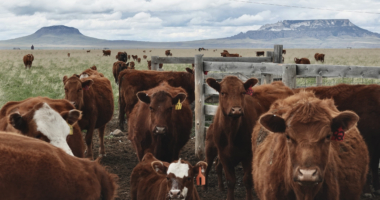ACR On the Road: Expanding Markets Conference

Bringing together ranchers, industry leaders, and environmentalists like ourselves, Western Sustainability Exchange (WSE) hosted its second annual Expanding Markets Conference in Billings on November 7th and 8th. After the success of last year’s conference, Montana Audubon both sponsored the event and covered the attendance fee for a handful of Audubon Conservation Ranching (ACR)-certified ranches. Speakers and attendees represented a breadth of stakeholders across the cattle industry with one question in mind: how can we work together to feed people, sustain rural communities, and work with nature?
Check out some highlights from conference speakers (WSE Instagram Reel)
In 2022, Grow Montana released a report that found most of the beef consumed in Montana is either imported or processed out of state before hitting our plates. The reality is that Montana is a cow-calf state, meaning most ranchers keep their calves for a year or so before sending them off to a finisher or a conventional feed lot. As both producers and processors remarked, Montana looks to be on the precipice of a market shift towards locally sourced beef.

Montana Audubon Director of Conservation Christian Meny presents at the Expanding Markets Conference in Billings, MT.
One notable producer group, direct-to-consumer operations, are breaking that mold. Matt Skoglund of North Bridger Bison and Jaimie Stoltzfus of Cowgirl Meat Co, two ACR-certified ranches, take a different approach; finishing animals at their respective operations and working directly with customers. Matt and his wife’s work as bison ranchers is all encompassing: taking orders for quarter and half bison, harvesting the animal, hauling them to a processor in Manhattan, and shipping the orders – all while managing the company’s Instagram (@northbridgerbison). Jaimie similarly built her business around making connections with consumers who want healthy food that supports the land it’s grown on. While surveying at the ranch she and her husband Austin manage, Peter and Bo bought a cooler full of ground beef and can confirm it’s good stuff!
When it comes to developing markets, direct-to-consumer operations have done a lot of work to create demand for grass-fed and grass-finished animals. On the other end of the regenerative food supply chain, we’re seeing new markets develop for grass-fed animals. Several beef aggregators spoke about rising demand for beef raised to meet environmental and animal welfare standards, which would in turn reward good stewards with a premium for their beef.
Anna Claussen, Director of Strategic Partnerships and Planning with the Growing GRASS project, spoke about how their group is leveraging $32 million of USDA Climate Smart Commodity Grants funding to standardize grass fed beef certifications across the country. Ranchers are spoiled for choice when it comes to certifications, and the direct market benefits are often unclear. This initiative would bring a handful of certifications, including Audubon’s, under one umbrella to make grass-fed beef markets simpler for ranchers to access while ensuring a high standard of environmental stewardship for the consumer.
For a second year, the Expanding Markets conference proved to be an invaluable experience for all attendees. We got the chance to meet like-minded ranchers, non-profit, and industry folks looking to change our food system for the better. It’s hard to wrap it all up in one blog post, so please visit our great partners Western Sustainability Exchange’s website and Instagram @wsemt for more information.
Thank you WSE for another great conference!
For more information:
Learn more about ACR in Montana:
- Conservation Ranching: Conserving and reviving rangelands with bird-friendly grazing
- Audubon Conservation Ranching- MT DEQ funds Truman Creek restoration at MT Better Beef Ranch
- Audubon and partners announce first bird-friendly certified bison ranch in Montana
- North Bridger Bison
- Cowgirl Meat Co.
This project is made possible through a grant from the National Fish and Wildlife Foundation with support from the Cornell Douglas Foundation.